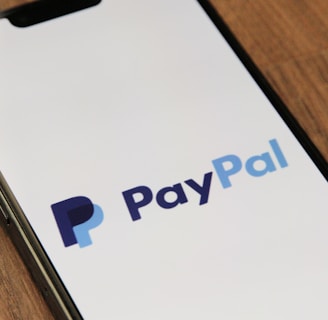
A PayPal Paradox That Might Surprise You
The Jewish connection, honey/paypal, and the modern banking scams | The Jewish community has long been associated with finance, not out of conspiracy., but through a historical necessity.
ARTICLES
Fouad FARJANI
12/23/2024
It all started with an email. A friend forwarded it to me, warning about the latest online scams. Nestled between a story about Nigerian princes and phishing schemes was something that stopped me in my tracks: a curious tale about PayPal, Honey, and the subtle, often unspoken influence of Jewish innovation in the world of banking and tech. As I read on, I felt the pull of a deeper story—one that intertwined history, modernity, and a lingering question: how much control does any of us truly have over our money in this increasingly digital world?
The Jewish Connection to Banking and Tech
Let’s rewind. The Jewish community has long been associated with finance, not out of conspiracy, but through a historical necessity. In medieval Europe, Jews were often barred from owning land and joining certain guilds. Lending money—a practice frowned upon by Christian doctrine—became one of the few professions available to them.
Over centuries, this association with finance evolved, and Jewish families played pivotal roles in shaping modern banking systems. From the Rothschilds’ influence on international finance to the founders of Goldman Sachs, the narrative of Jewish financial acumen became part of the broader story of capitalism.
Fast forward to the 21st century, and that same ingenuity has carried over into the tech world. PayPal, for instance, is a prime example. Co-founded by Max Levchin, a Ukrainian Jew, along with Peter Thiel and Elon Musk, PayPal revolutionized online transactions.
Levchin brought not only his technical expertise but also a mindset shaped by a cultural emphasis on adaptability and innovation—qualities often attributed to Jewish heritage.
But what’s often overlooked is the broader ecosystem PayPal has created. It’s not just a payment platform; it’s a financial network that influences how billions of dollars flow worldwide. And this brings us to Honey, the seemingly innocuous browser extension PayPal acquired in 2020 for a whopping $4 billion.
The Honey Trap
Honey, for the uninitiated, is a browser extension that claims to save users money by automatically applying coupon codes at checkout. On the surface, it’s a shopper’s dream. Who doesn’t want to save a few bucks without lifting a finger? But dig a little deeper, and the picture gets murkier.
Honey operates by tracking your online activity. It collects data on the websites you visit, the items you view, and, of course, what you ultimately buy. This treasure trove of consumer behavior is then fed back to PayPal. While Honey markets itself as a helpful tool for consumers, it’s really a data goldmine for its parent company. This isn’t just speculation—it’s written into Honey’s own privacy policy.
Now, imagine this: you’re shopping for a new pair of sneakers. Honey swoops in, applies a coupon code, and saves you $10. Great, right? Except now PayPal knows not only what you bought but also where you bought it, how much you paid, and what other items you considered. This data can be sold to advertisers, used to manipulate pricing, or even leveraged to predict economic trends.
The so-called “savings” Honey offers often aren’t savings at all. Many retailers inflate their prices, knowing that tools like Honey will “discount” them. So, while you think you’re getting a deal, you’re actually paying the same—or more—than you would have otherwise. It’s a psychological game, one that plays on our innate desire to snag a bargain.
The Bigger Picture: PayPal, Data, and Control
This brings us back to PayPal and its broader implications. PayPal isn’t just a payment processor; it’s a data aggregator, a middleman, and—in many ways—a gatekeeper. By owning Honey, PayPal extends its reach far beyond the checkout page. It’s not just processing your transactions; it’s influencing them.
PayPal has been known to freeze accounts without warning, often for vague reasons like “suspicious activity.” For small businesses and freelancers, this can be devastating. Imagine not being able to access your own money for weeks or even months. It’s a stark reminder of the power these platforms wield—power that’s largely unchecked.
And then there’s the issue of scams. PayPal has long been a target for fraudsters, from phishing emails to fake payment notifications. The irony? While PayPal touts its security features, its very existence enables these scams to proliferate. It’s a double-edged sword, one that leaves consumers in a perpetual state of vulnerability.
The story of PayPal and Honey feels, in many ways, like a modern echo of the historical relationship between Jews and finance. It’s a story of innovation born out of necessity, of creating systems that both empower and exploit. But it’s also a cautionary tale about the concentration of power.
In the medieval era, Jewish moneylenders were often scapegoated for economic woes. Today, tech companies like PayPal face a similar scrutiny. They’re praised for their convenience but criticized for their opacity. And while the stakes are different, the underlying dynamics remain the same: a small group controlling the flow of money, data, and, ultimately, influence.
Who’s Really in Control?
As consumers, we’re often lulled into a false sense of security. We trust that companies like PayPal have our best interests at heart, that tools like Honey are genuinely designed to save us money. But the reality is far more complex.
PayPal isn’t just a service; it’s a system. Honey isn’t just a tool; it’s a trap. And the Jewish connection? It’s a reminder that history has a way of repeating itself, often in ways we least expect.










